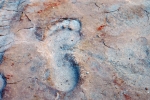 Geologically speaking, nature usually calls the shots. Historically it’s been the case that major natural events—shifting tectonic plates, volcanoes, even asteroids—have shaped the trajectory of life on this planet. Not anymore. A team of researchers from the University of Leicester and the Geological Society of London is the latest group to make the case that the Holocene era is coming to an end, and the Anthropocene (meaning, basically, man-made) is on its way in. Our impact on the planet is so profound, say the scientists, we’ve changed our home for good. The evidence:
Geologically speaking, nature usually calls the shots. Historically it’s been the case that major natural events—shifting tectonic plates, volcanoes, even asteroids—have shaped the trajectory of life on this planet. Not anymore. A team of researchers from the University of Leicester and the Geological Society of London is the latest group to make the case that the Holocene era is coming to an end, and the Anthropocene (meaning, basically, man-made) is on its way in. Our impact on the planet is so profound, say the scientists, we’ve changed our home for good. The evidence:
* Vastly altered sediment erosion and deposition patterns.
* Major disturbances to the carbon cycle and global temperature.
* Wholesale changes in biology, from altered flowering times to new migration patterns.
* Acidification of the ocean, which threatens tiny marine life that forms the bottom of the food chain.
This isn’t a new idea. The term “Anthropocene Era” was coined by Paul Crutzen, winner of the 1995 Chemistry Nobel Prize. Crutzen identified three phases of the era—and made some guesses as to what we can expect next.
If you’re still not convinced, consider another recent study: Soil scientists at Duke University say that these days, even the dirt beneath our feet is man-made. Says lead researcher Daniel Richter:
“With more than half of all soils on Earth now being cultivated for food crops, grazed, or periodically logged for wood, how to sustain Earth’s soils is becoming a major scientific and policy issue.”
To see a cool interactive map of humans’ effect on soil worldwide, go here.















